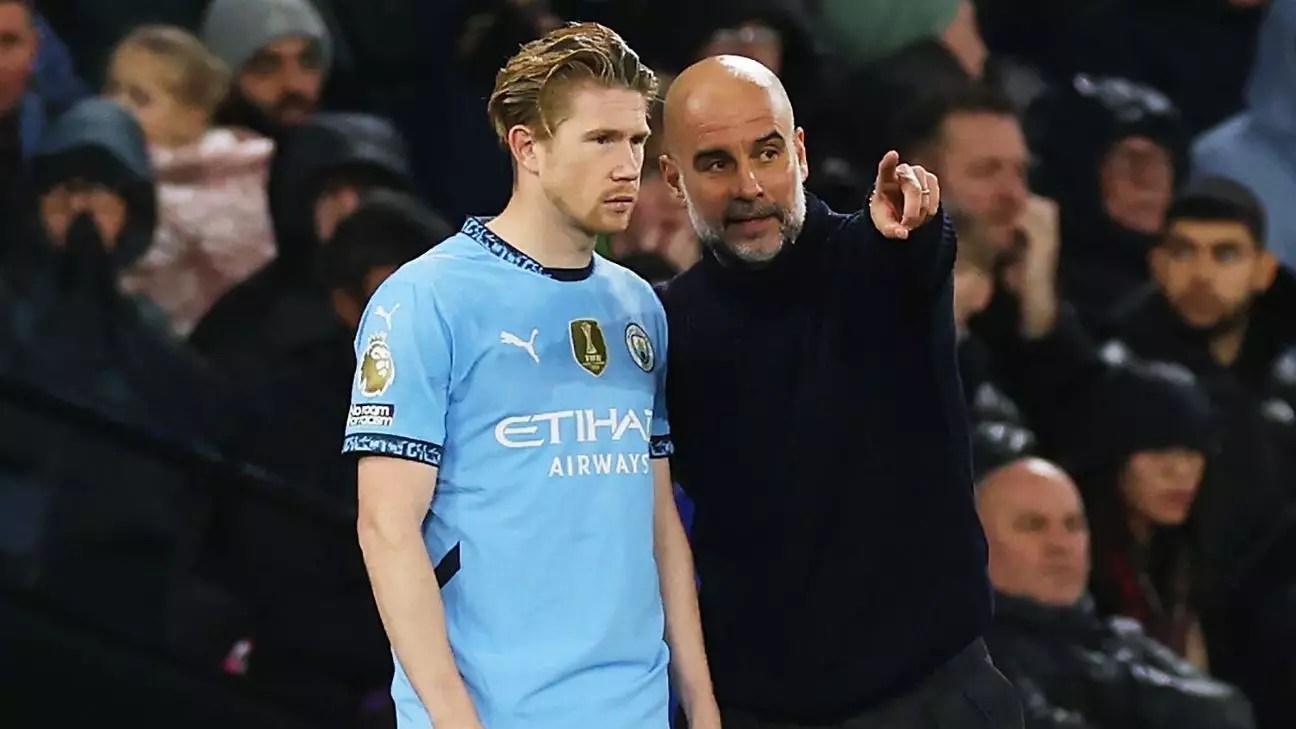In recent weeks, Manchester City has been grappling with inconsistency on the pitch, exacerbated by the absence of their star midfielder, Kevin De Bruyne. Since returning from an abdominal injury sustained during the UEFA Champions League final against Inter Milan in September, De Bruyne has only managed five substitute appearances. This limited playing time has sparked speculation regarding the relationship between the esteemed coach Pep Guardiola and the 33-year-old Belgian. Observers are questioning whether off-field tensions are influencing De Bruyne’s current standing in the team.
Guardiola finds himself in the eye of the storm after City’s disappointing performances, culminating in a 2-0 loss against Liverpool. The timing of De Bruyne’s substitution—being brought on only when the team was already in a precarious position—has ignited whispers of discontent. Former players and pundits, such as Gary Neville and Jamie Carragher, have not only expressed astonishment at De Bruyne’s exclusion from the starting lineup but have gone so far as to imply that there is something amiss between the two key figures at Manchester City.
In a recent press conference, Guardiola proactively addressed the assumptions surrounding De Bruyne’s limited role. Without being directly questioned on their relationship, he dismissed the narrative of a personal feud, stating, “People say I’ve got a problem with Kevin… I don’t want to play without him. He is the most talented player we have.” This forceful rebuttal underscores a key facet of Guardiola’s management style: a staunch defense of his players in the face of external scrutiny.
Guardiola’s assertions illuminate the coach’s perspective on the intricacies of squad management. He acknowledges that De Bruyne has faced significant physical challenges, emphasizing the impact of age and injury on a player who has contributed immensely to City’s success over the years. Guardiola’s sentiment that he is eager to reintegrate De Bruyne into the lineup expresses his belief in the player’s abilities, tempered by a cautious understanding of the realities of sports aging.
Despite Guardiola’s confident rhetoric, the harsh truth remains: Manchester City has suffered from a perplexing run of form. With four consecutive league defeats now part of their narrative, the squad’s need for rejuvenation has become glaringly evident. De Bruyne’s return could prove pivotal, yet Guardiola tempers expectations by stating that no single player, regardless of talent, can singularly rectify the team’s challenges.
The complexities of football dynamics dictate that the solution lies not just in featuring players with individual brilliance, like De Bruyne or Erling Haaland, but rather in cohesive team performance. Guardiola, renowned for his tactical acumen, admits the importance of collective effort in both attacking and defending. This holistic approach to team play could be the silver lining that City needs as they approach their next fixture against Nottingham Forest.
As City prepares for their upcoming match, Guardiola’s remarks hint that De Bruyne may reclaim a more substantial role, presenting an opportunity to reinvigorate a side clamoring for a victory. However, the road ahead remains fraught with challenges. De Bruyne’s gradual re-entry into the team is not merely a question of fitness; it involves strategic consideration, as Guardiola weighs the benefits of a fully fit De Bruyne against the risks associated with his recurring injuries.
Ultimately, the relationship between Guardiola and De Bruyne, although under scrutiny, is a complex interdependence fueled by mutual respect. Guardiola’s openness in addressing the speculation surrounding his decisions reveals his commitment to transparency, while De Bruyne’s history with the club solidifies him as a staple of City’s identity. As they navigate this tumultuous period, the hope remains that both the coach and the midfielder can find common ground that reaffirms their shared pursuit of success on and off the pitch.


Leave a Reply